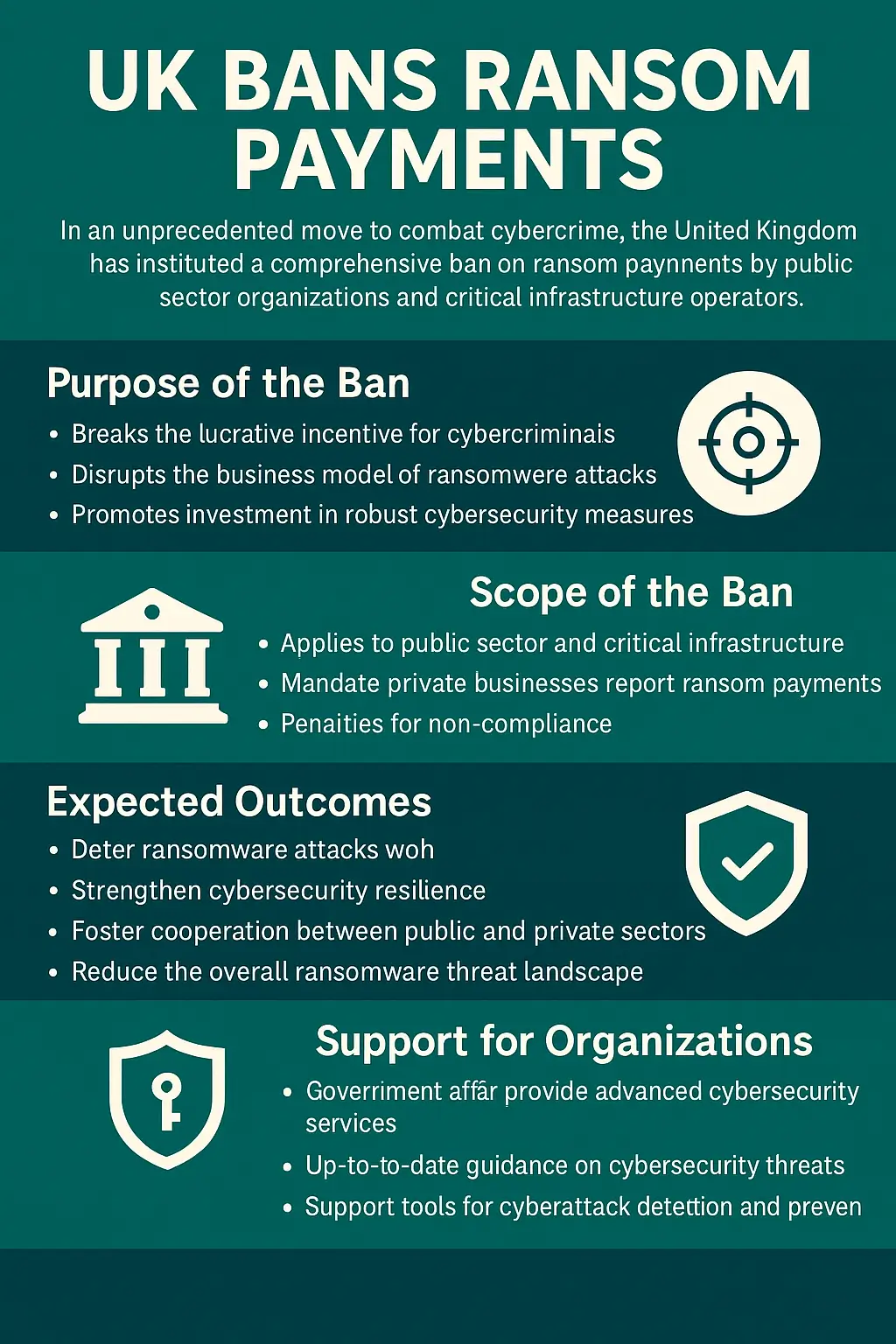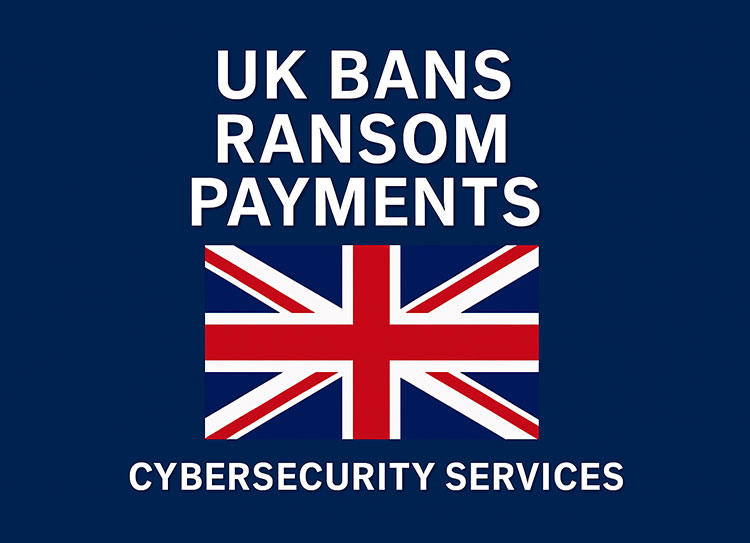UK Bans Ransom Payments: A Story of Risk, Resilience, and Reinvention
Imagine waking up one morning to find your city council’s entire IT system locked. Emergency services can’t access vital data. Hospitals face delays in treating patients. Schools are unable to retrieve student records. A ransom note flashes across every screen: “Pay us in cryptocurrency—or lose everything.”
For years, governments and organizations across the world have faced this nightmare. Some chose to quietly pay millions to cybercriminals, believing it was the fastest way to restore operations. But in July 2025, the United Kingdom drew a line in the digital sand: the UK bans ransom payments by public sector bodies.
This isn’t just another headline—it’s a pivotal shift in how the world confronts cybercrime.

A Crisis Reaching Breaking Point
Ransomware has surged into a multi-billion-dollar criminal economy. In the past decade, it has crippled hospitals, shut down city administrations, and even disrupted global supply chains. The UK government reported that ransomware attacks had doubled since 2020, with public sector entities often the primary victims.
What made the situation worse was the payment dynamic. When organizations paid ransoms, they didn’t just regain access to stolen data—they also fueled the cybercriminal economy, emboldening attackers to strike again.
It became a vicious cycle. Each payment was like oxygen for cybercrime.
The Turning Point: UK’s Ban
On July 22, 2025, the UK government announced a sweeping ban preventing public sector bodies—including hospitals, schools, councils, and critical infrastructure operators—from paying ransoms.
The government’s reasoning was twofold:
- Starve cybercriminals of revenue. By eliminating payouts from major public institutions, the UK hopes to reduce the financial incentive for launching ransomware attacks.
- Push for resilience. Organizations must now invest in stronger cybersecurity services, incident response planning, and backup strategies rather than relying on ransom payments as a last resort.
The ban also requires private businesses to report ransom payments, creating greater transparency in how cyberattacks are handled.
The Global Context
The UK’s decision isn’t happening in isolation. Across the Atlantic, the United States has debated similar measures. The European Union has also considered tightening reporting requirements for ransom incidents.
But the UK is among the first major economies to take such a decisive stance. It’s a signal to both allies and adversaries: paying criminals is no longer an option.
The Human Cost of Ransomware
To understand the weight of this decision, let’s step into the shoes of a hospital IT director in Manchester.
It’s a quiet Sunday morning when the phone rings. Systems are down. Electronic patient records are inaccessible. The ransomware gang has demanded $5 million in Bitcoin. Every second lost puts lives at risk.
In the past, the board might have approved the payment to restore services. But under the new law, payment is not an option. Instead, the hospital must rely on:
- Cybersecurity services to detect, isolate, and neutralize the threat.
- Backup systems to restore data from secure storage.
- Crisis communication teams to keep patients and staff informed.
It’s painful. It’s slow. But it’s also the beginning of a safer future—one where hospitals aren’t perpetually blackmailed.
How Cybersecurity Services Step In
The ban raises a critical question: If paying ransoms is no longer allowed, how do organizations recover?
The answer lies in robust cybersecurity solutions. These services provide the backbone of resilience:
- Proactive Defense – Threat detection, AI-driven monitoring, and penetration testing to identify weaknesses before attackers exploit them.
- Backup and Recovery – Encrypted, offsite backups that allow systems to be restored without paying criminals.
- Incident Response – Expert teams that step in during an attack, containing the damage and orchestrating recovery.
- Employee Training – Since phishing remains the leading entry point for ransomware, training staff to recognize threats is essential.
- Zero Trust Architecture – Limiting access privileges to ensure that a single compromised account cannot expose entire systems.
The UK government is simultaneously investing in national-level cyber defense programs, but the responsibility also falls on local councils, hospitals, and schools to engage professional IT and cybersecurity providers.
The Debate: Critics vs. Supporters
Not everyone is cheering the ban.
Critics argue:
- Lives could be at risk. In sectors like healthcare, refusing to pay could delay critical services.
- Attackers may retaliate. Cybercriminals could respond by escalating attacks on UK organizations, knowing they can’t be bought off.
- Cost burden. Smaller councils and schools may struggle to afford the level of cybersecurity services now required.
Supporters counter:
- Paying was never a guarantee. Many victims who paid ransoms didn’t get their data back anyway.
- It breaks the cycle. Removing ransom payments cuts off the criminals’ business model.
- Encourages resilience. Instead of relying on criminals to “fix” the problem, organizations are pushed to build stronger defenses.
A Case Study in Courage
Consider the city of Bristol. In 2023, the council reportedly suffered a ransomware attack that temporarily disrupted public services. At the time, they debated paying a multimillion-pound ransom but ultimately refused. Instead, they worked with cybersecurity services to restore systems from backups.
The recovery was slow, expensive, and politically controversial—but in hindsight, it positioned Bristol as one of the first councils to embody the new 2025 policy.
The UK government now holds up such cases as examples of resilience over ransom.
Ripple Effects Across the World
The UK’s decision will likely inspire ripple effects:
- International Norms: Other countries may follow suit, especially allies like the US, Canada, and Australia.
- Cybercriminal Behavior: Attackers may shift focus to private companies or nations without such bans.
- Insurance Industry: Cyber insurers, once criticized for indirectly encouraging ransom payments, may adapt policies to support recovery over payment.
- Tech Investment: Demand for cybersecurity services, backup solutions, and AI-driven monitoring will surge.
What Businesses in North Carolina Can Learn
Even though the ban applies to the UK, its implications stretch globally—including to regions like North Carolina, where businesses are increasingly targeted by ransomware gangs.
Key lessons:
- Don’t wait for a ban. Adopt a “no payment” policy internally.
- Invest in cybersecurity services. Prevention is always cheaper than recovery.
- Know your backups. Ensure you can restore systems quickly.
- Report incidents. Transparency helps build collective defense.
- Train your people. The best firewall is an aware employee.
For businesses in sectors like healthcare, finance, and local government, these lessons aren’t theoretical—they’re survival strategies.
The Road Ahead
The UK’s ban on ransom payments is not the end of ransomware. Cybercriminals are adaptable, and the digital battlefield is constantly evolving. But it is a bold move to change the rules of engagement.
By refusing to fund attackers, governments hope to dry up the profitability of ransomware and push organizations toward a culture of resilience.
It’s a gamble—but one that could redefine the global fight against cybercrime.
Final Thoughts
The phrase “UK bans ransom payments” will echo through cybersecurity history as a turning point. Just as nations once outlawed negotiating with terrorists, the digital age now demands a similar stance against cyber extortionists.
For public institutions, the future lies not in desperate payouts but in partnerships with cybersecurity services, smarter defenses, and stronger global cooperation.
The next time a ransomware gang tries to hold a hospital, a school, or a city hostage, the answer will be firm, united, and simple: No.

